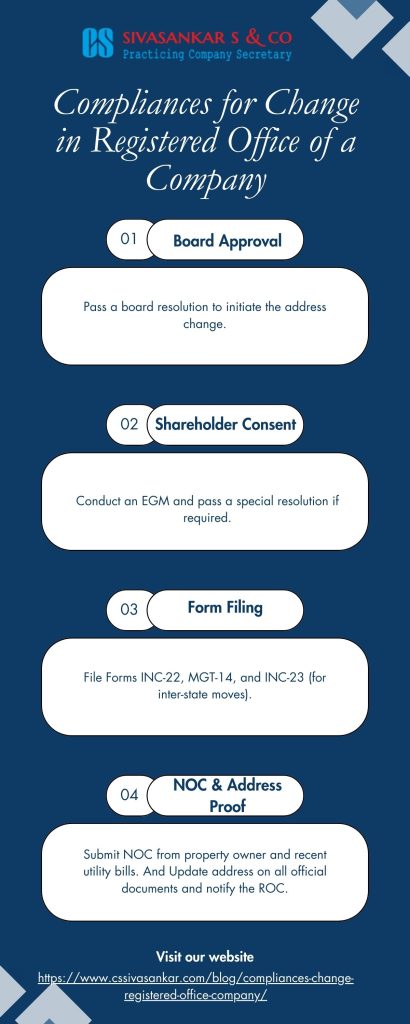Introduction
When a company grows, relocates, or adjusts its operations, one crucial change it may undergo is altering its registered office. The process of changing a company’s registered office is not merely a logistical move but a legally regulated action governed by the Companies Act, 2013.
The compliance requirements vary based on the new location of the registered office, especially when it moves across state lines. For this reason, businesses often seek expert guidance from a practising company secretary to ensure compliance at each step.
1. Types of Changes in Registered Office Address
The Companies Act, 2013 defines three primary types of registered office changes. The required compliances vary depending on which of these categories the change falls into:
- Change within the same city/town/village: This is the simplest type, involving minimal documentation.
- Change outside the local limits but within the same state and ROC (Registrar of Companies) jurisdiction: This type requires shareholder approval.
- Change from one state to another (and change of ROC jurisdiction): This type involves multiple layers of approval, including consent from shareholders, creditors, and even the Regional Director (RD).
Understanding these classifications is essential for a compliant and smooth transition.
2. Compliances for Changing the Registered Office
Here’s a breakdown of the steps involved in the compliance process for each type:
A. Change within the Same City, Town, or Village
- Board Meeting: Convene a board meeting to approve the office change and authorize the submission of required forms.
- Form Filing: File Form INC-22 with the ROC within 30 days of passing the board resolution. Documents required include proof of address (e.g., utility bills not older than two months), a No Objection Certificate (NOC) from the property owner, and a rent/lease agreement if applicable.
- Updating Records: Update the registered office address on the company’s letterheads, website, and other official documents.
B. Change outside Local Limits but Within the Same State and ROC Jurisdiction
- Board Meeting: A board meeting must be held to approve the office relocation and fix a date for an Extraordinary General Meeting (EGM) to secure shareholder approval.
- Shareholder Approval: The EGM must pass a special resolution, approving the shift. A certified copy of this resolution is to be filed with the ROC.
- Form Filing: Submit Form MGT-14 (to register the special resolution) and Form INC-22 along with necessary documents (NOC, utility bills, rental agreement, etc.).
- Notification and Updates: The address change should be updated on all official platforms and communicated to concerned stakeholders.
Working with a professional who offers comprehensive corporate secretarial services simplifies the process, providing peace of mind and a guarantee that every step is in line with legal standards.
C. Change from One State to Another (Including Change of ROC Jurisdiction)
This type of change is the most complex and requires approvals beyond the board and shareholders.
- Board Meeting: Hold a board meeting to approve the relocation and the subsequent steps.
- Special Resolution and EGM: An EGM must be called to pass a special resolution for the address change and to alter the company’s Memorandum of Association (MOA).
- Public Notice and Creditors’ Consent: The Company must publish a notice of the proposed change in two newspapers (one English and one in the local language). This is crucial to inform stakeholders and creditors, as their consent is necessary.
- Application to Regional Director: The application (using Form INC-23) must be submitted to the Regional Director (RD) along with copies of the resolution, MOA, and confirmation of newspaper publications.
- Form Filing: Upon RD approval, Form INC-22 is filed with the ROC along with proof of address and other documents. Also, file Form MGT-14 within 30 days of passing the resolution.
- Notification and Record Updates: After the approval, update all necessary records and communicate the address change to stakeholders.
3. Documents Required for Registered Office Change

Each type of office change requires certain documents. Here is a list of common documentation:
- Board Resolution and Shareholder Resolution
- Proof of Address
- No Objection Certificate (NOC)
- Copy of MOA
- Newspaper Advertisements
- Application and Approval Letters
4. The Role of a Practising Company Secretary
Ensuring a compliant and smooth transition of the registered office involves navigating various legal and regulatory steps. This is where the expertise of a practising company secretary in Chennai or your respective location comes into play. A company secretary’s corporate secretarial services include overseeing compliance, documentation, and filings, mitigating any risks of non-compliance.
5. Why Compliance is Important
A registered office is more than just a mailing address; it’s the legal residence of the company. Failing to comply with address change regulations can result in significant penalties and hinder company operations. Some key reasons why compliance is essential include:
- Legal Notices and Communication: The registered office address is where legal notices and official government communication are sent.
- Transparency and Credibility: Following legal protocols enhances the company’s reputation and transparency with stakeholders.
- Avoidance of Penalties: Non-compliance can lead to fines and penalties from regulatory authorities, which can be costly and damaging.
In short
Changing the registered office address is a significant administrative decision with numerous compliance requirements. Whether it’s an intra-city move or an inter-state relocation, adhering to the steps outlined by the Companies Act, 2013, is critical.
By consulting with a practising company secretary, companies can ensure they meet all legal requirements with minimal hassle, paving the way for a smooth transition to their new registered address.
Keeping all these steps in mind will help a company successfully change its registered office without encountering compliance issues, ensuring they remain aligned with regulatory standards and maintain their professional credibility.
Conclusion
Whether you’re a start-up expanding your base or an established corporation restructuring operations, it’s essential to follow due process when changing your registered office address.
Navigating through compliances with expert assistance from company secretarial services ensures every move is by the book. A structured approach to compliance protects your company from potential penalties and facilitates seamless business operations.

